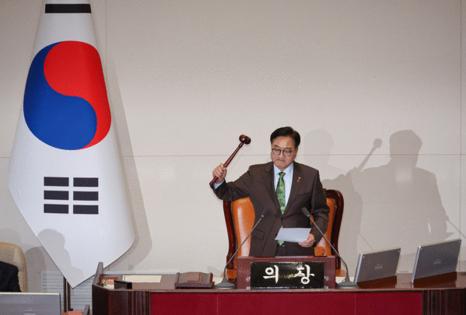Koreans in metro Atlanta hail impeachment of South Korean president
Published in News & Features
South Korean President Yoon Suk Yeol’s impeachment after his short-lived martial law decree is being met with celebration among many in metro Atlanta’s Korean community.
Dozens of Korean community members gathered Saturday afternoon at Shorty Howell Park in Duluth to celebrate the National Assembly’s vote to impeach Yoon, carrying posters that read in Korean, “We condemn the illegal martial law,” “Impeach Yoon Suk-Yeol” and “Immediate arrest of the insurrection leader.” Others who spoke to The Atlanta Journal-Constitution called Yoon’s martial law decree shameful but the resilience of the Korean people a triumph.
Yoon issued an emergency martial law declaration Dec. 3 in response to political gridlock, accusing the opposition party of paralyzing the government with “pro-North Korean antistate forces.” He sent hundreds of troops to the National Assembly to block its vote against the decree as citizens watched from their televisions in shock.
Although the martial law lasted only six hours, it’s thrown the democratic nation into crisis, sparking mass protests attended by tens of thousands across the nation, and heightened anxiety among Koreans living abroad with family in Seoul.
This was the National Assembly’s second vote to impeach Yoon in the past week. The opposition party, which controls the National Assembly, managed to collect enough votes from the ruling party to pass the motion 204-85 Saturday.
The Constitutional Court has up to 180 days to decide whether to reinstate or formally dismiss Yoon.
“I was shocked at the time of the martial law, but now we are celebrating that the National Assembly made the right decision, and we are expecting the Constitutional Court to do the same, but we will have to wait and see,” said Attorney Jongwon Lee, who attended Saturday’s gathering in Duluth’s Koreatown in support of the impeachment.
For 32-year-old Lana Park, another attendee, Yoon’s sudden martial law declaration was something out of a Korean history textbook. She called it “absurd and nonsensical.”
“At first, I thought I had misheard,” said Park, who immigrated to the U.S. in 2020. “Martial law is something I was taught in history class, not something of modern times.”
Military dictatorships and political violence still live in the recent memory of many older Koreans who witnessed the nation’s struggle to democratize in the 1980s, including Seam Park’s parents, who immigrated to the U.S. in 1988.
“That experience (of political violence) drove a lot of immigrants like my parents to the U.S.,” Seam Park, 45, said. “They didn’t want me and my brother to be subject to that.”
And even for younger Koreans like Lana Park, trauma has been passed down generationally through word of mouth, reading books and watching films that portray the nation’s history of political violence.
Korea’s highest-grossing film of 2023, “12.12: The Day,” followed the events of the nation’s previous martial law decree, in 1979, while “The Boy Is Coming,” a novel about the pro-democracy Gwangju Uprising in 1980, saw a surge in sales after author Han Kang was awarded the Nobel Prize in Literature in October.
After the National Assembly’s vote, Washington has been in contact with South Korean leadership to reaffirm the two nation’s “ironclad alliance.”
Prime Minister Han Duck Soo, who is serving as acting president, and U.S. President Joe Biden spoke over the phone Sunday to discuss regional security challenges, including North Korea’s nuclear program. U.S. Ambassador to South Korea Philip S. Goldberg said in a statement Saturday that he met with Korean Foreign Minister Cho Tae Yuk after the impeachment.
“Our commitment to peace and security on the Peninsula and in the region is unwavering,” Goldberg said. “We will continue to be in close contact with the government as the democratic process continues in accordance with the constitution.”
South Korea also has close ties to Georgia, which is home to more than 150,000 Korean Americans and several multibillion-dollar projects by Korean corporate giants, including Hyundai Motor Group, SK Group and LG. Businesses have been monitoring the situation in Seoul but have not reported any related consequences yet.
While there still remains a lot of uncertainty surrounding whether the Constitutional Court will formally dismiss Yoon, which would lead to a national election that must be held within 60 days, some remain cautiously optimistic.
“I have more hope than fear,” Lana Park said.
©2024 The Atlanta Journal-Constitution. Visit at ajc.com. Distributed by Tribune Content Agency, LLC.







Comments